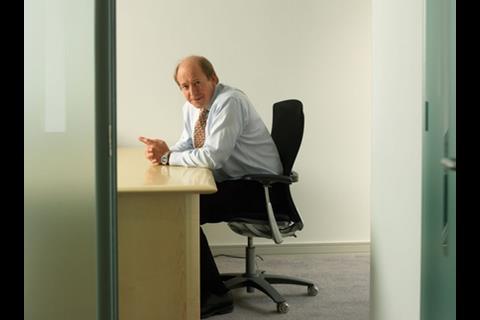Chief executive in confident mood as City predicts record turnover for UK’s largest contractor
By his own admission, Ian Tyler, Balfour Beatty’s chief executive, finds himself in a “slightly odd position” at the moment.
It’s 12 days before the company’s results for the year to 31 December 2007 are announced and, although the broader economic picture is one of doom and despondency, most of the City is purring at the prospect of the UK’s largest contractor breaking through the £7bn-turnover barrier with pre-tax profit touching £200m. In 2006 it made £125m on sales of £5.9bn.
The contradiction of credit crunch headlines and Balfour Beatty’s relentless rise from a £3bn-turnover contractor five years ago is not something that worries the amiable Tyler. “We are in a position that’s as strong as it’s ever been. We’re confident about the next two years.” He concedes the commercial market may dampen over time, but it’s not an area to which Balfour Beatty is heavily exposed.
Then again, when your work is spread across 17 markets and four continents, what can go wrong? “There’s no real answer to that question,” he says, smiling. “There are all sorts of things we’re keeping an eye on, but there’s no one issue that will fundamentally affect the business in the long term.”
According to Joe Brent, a Citigroup analyst, things to be watched include a slowdown in spending by the UK government and its “underweight” operations in the booming Middle East market, which leave it “nowhere to bail out” should things turn nasty elsewhere in the world.
Like the US, for example. Tyler wants turnover contribution from across the pond to grow in the medium term from 25% to 40%, and even talk of a US recession is not something that outwardly worries him.
He says: “We have a balanced spread of businesses across six states that vary markedly. Only 10% has any exposure to the weakening residential market.”
We don’t spend too much time worrying about what people think about us
Perhaps his relaxed demeanour is also owing to the purchase of Texas-based housebuilder Centex for £184m last February, dubbed “a great bit of business” by one analyst. This was followed last week by GMH Communities Trust, snapped up for £180m. Both are big players in the military market, and US spending on soldiers’ accommodation is unlikely to fall anytime soon.
It is the kind of canny decision-making that has led to Tyler’s solid reputation in the Square Mile since he stepped up from chief operating officer to replace Mike Welton on New Year’s Day 2005. At the time, the share price was 311p and it has climbed steadily since (see graph, opposite) to 451p this week.
Most analysts agree that his three-year tenure has been marked by substance over style. Andy Brown, an analyst at Panmure Gordon, says: “From an investment point of view Balfour does what it says on the tin. It is a solid contractor and engineer without the bells and whistles. It lets the share price take care of itself, based on delivery.” Tyler agrees: “We don’t spend too much time worrying about what people think about us. In the long term it will come down to delivery, provided that we do what we say.”
Another analyst says its heads-down approach can border on arrogance, despite the chief executive’s likeability. “Its presentations are limited to the basic details and seem to say, ‘We’re huge and have been doing this for years so you’ll have to come looking if you want any more information’.”
Amid the substance/style debate, some have argued the share price is undervalued, given the company’s robustness. It prompts a diplomatic reply from Tyler: “The share price is what it is. If I compare it with other companies I cannot rationalise why we’re valued as we are and others are too. Maybe there is a lack of belief out there about our ability to manage risk.”
Maybe so, but his prudent cash management has led some in the City to label him a safe pair of hands. It is a description that raises a smile but one he is not entirely comfortable with, perhaps because it suggests an unfavourable comparison with John McDonough at Carillion. He has taken over Alfred McAlpine to create a £5.3bn company.
Tyler says: “Safe, in that we have avoided the type of risk that can kill the sector? It’s very nice to be called that but if it’s implying we are less dynamic than our rivals, I would point to an exciting growth curve against a strategy that has delivered the goods.”
We didn’t indulge ourselves with Alfred McAlpine because it wouldn’t have really got us anywhere
And those sexy Carillion deals? “At the time we had a look at Mowlem, but we didn’t indulge ourselves with Alfred McAlpine because it wouldn’t have really got us anywhere. In terms of Mowlem, I would say it was a better fit for Carillion than us.”
Given his background as a chartered accountant, just how attached is he to a no-nonsense contractor like Balfour Beatty? “Enormously. I’m deeply proud of what it does and somewhat humbled by what I do. I am also very excited about what we can achieve over the next five years.”
Then the accountant’s pragmatism kicks in. “But at the end of the day, my job is to maximise value for shareholders and if someone comes over the hill with an offer that is in the best interest of shareholders I’d have to look at it.”
Looking forward, he says the company will follow the wider trend towards support services, although the emphasis will be on consultancy rather than facilities management. In the medium term, he plans to double its profit contribution from 10% to 20% through “thoughtful and careful” growth.
As the 47-year-old Tyler admits: “The relationship with major customers has changed because they are simply requiring more of us – not just as a deliverer but in terms of wider skills management. For example, the National Grid needs us to provide intellectual input as opposed to just delivery. They are skills we can’t outsource.”
Not that he likes the label “support services”. He prefers to call it the “management” side of the business. “One end of support services is upstream and the other is maintenance. I don’t know why the bit in the middle called ‘contracting’ should be seen as any riskier.”
If Balfour’s growth continues at this rate, it won’t be for long.
Curriculum vitae
Graduated in chartered accountancy from Birmingham university
1991-93 Group financial comptroller, Hanson
1993-96 Finance director of Hanson subsidiary ARC
1996 Joins Balfour Beatty as finance director
Aug 2002 Chief operating officer
Jan 2005 Chief executive
Total pay in 2006: £793, 287
How Balfour has grown under Tyler
2004
Staff 28,000
Turnover £4.2bn
Pre-tax profit £106m
Order book £6.8bn
2008
Staff 35,000
Turnover £7.5bn (estimate)
Pre-tax profit £197m (estimate)
Order book £11bn (estimate)
New sectors since Tyler took charge:
- Construction, PPP and support services in the US, PPP in South-east Asia, PPP in western Europe
- Non-PPP infrastructure investment (Exeter airport, bought for £60m in January 2007)
- Full-service integrated facilities management in the UK
- Since the purchase of Birse in June 2006, civil engineering in the rail sector, coastal engineering and process engineering
Downloads
Tyler’s reign of ‘thoughtful and careful’ growth
Other, Size 0 kb
Postscript
See www.building.co.uk/archive for more on Balfour Beatty



























No comments yet